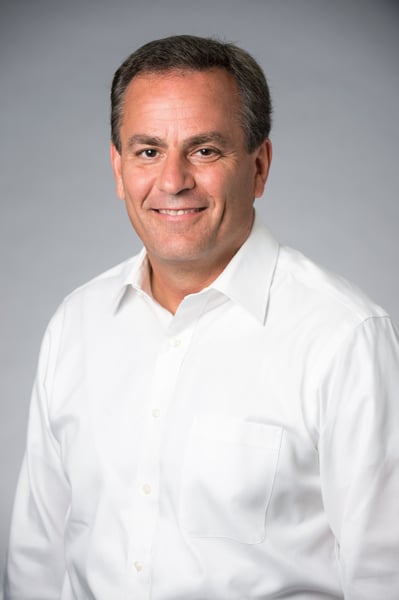“I ended up being the runner-up for the job,” Stafford says. “But, two months later, I was contacted about a new position with the Standard & Poor’s [S&P] Information Group [a subsidiary of McGraw-Hill] that turned out to be a better position than the one to which I originally applied.”

He became the S&P Information Group’s first on-site attorney, and his stature and responsibilities grew immediately. Still in his twenties, he went from pushing paper at his former law firm to sitting at the table with senior executives of a complex global business with hundreds of millions of dollars in revenue.
Among other responsibilities, Stafford supported S&P’s licensing of its indices to sponsors of financial products. And, with support from outside counsel, he helped lay the legal foundation for index owners being entitled to license fees for the use of their IP. He emerged as a key driver of S&P’s index business. Today, this aspect of S&P’s business generates approximately $700 million in annual revenue. He came to be perceived by the business executives as a valuable partner who could be looked at for both legal and commercial advice, and it didn’t hurt that he was well-liked and was comfortable in social situations with his colleagues.
Stafford’s success garnered the attention of McGraw-Hill, and in 1996 he was asked to join the parent company’s legal team. He took advantage of the opportunity to expand his areas of expertise and eagerly immersed himself in M&A, antitrust analysis, IP, employment matters, and corporate governance. Through the work, he became one of five young McGraw-Hill executives selected to participate in the Global Leadership 2020 program, run by the Tuck Business School at Dartmouth. Stafford attended one-week executive training programs at Tuck, at Oxford University, and in the city Shanghai. “My selection to participate in the program made me aware of the investment the company was making in me and how seriously it was taking my growth potential,” Stafford says.
The five years after that were characterized by slow movement through the ranks and assurances that Stafford had emerged as a leading candidate to succeed the existing general counsel when he retired. However, this period turned out to be a prelude to an unexpected career twist: Stafford was offered the position of senior vice president of corporate affairs and assistant to the chairman and CEO, Terry McGraw. This nonlegal role involved oversight of corporate affairs, including communications, marketing, government relations, and corporate philanthropy, plus ongoing work with the company’s board of directors.
“I was in a very comfortable environment in the legal department, but I decided to accept a stretch position and found myself in unfamiliar territory as chief of staff to Mr. McGraw, who was a high-profile CEO,” Stafford says. “It was a huge career shift with an unknown outcome.”
The move took Stafford from the confines of the legal department directly into the upper tier of the C-suite at a multibillion-dollar public company. It came with a huge office, with a fifteen-foot ceiling, fireplaces, dark paneling, and a view of Rockefeller Center. It also raised his profile by associating him with the company’s largest and most challenging issues.
However, it also unexpectedly put him in the middle of the intensely negative attention the company received thereafter as the US financial crisis hit. The company’s S&P Ratings unit was accused of helping precipitate the crisis by assigning high ratings to a variety of mortgage-backed securities that were impacted by an unprecedented crash in housing prices. The company’s stock price plummeted. Relationships with the board of directors became more difficult. The stress level was high. Stafford ultimately left the chief of staff position, succeeded by someone with more experience in crisis management and communications, and he returned to the legal department.
In a final twist, when McGraw-Hill Education was sold to a private equity firm, in 2013, at the urging of Mr. McGraw, Stafford was offered his current position of general counsel—a challenge he immediately accepted. Stafford subsequently built a new legal department from scratch and has emerged as a highly respected leader on the senior management team. “I enjoy my role as general counsel of a multibillion-dollar education company immensely,” he says. “Our company is in an industry that helps people learn and reach their full potential, and I enjoy close and supportive relationships with my team and my colleagues.”
Looking back on his many roles, Stafford advises young lawyers to expect twists and turns and not to think their careers will play out exactly as they envision. “Expect the unexpected,” he says. He also tells them that when they face pivotal decisions, they should challenge themselves and not always take the safe road.
“By taking calculated risks, you develop your capabilities and your relationships, personally and professionally, and facilitate personal growth” Stafford says. “Deciding to jump into the deep end of the pool even before I could swim particularly well has given back more than I could possibly have imagined.”
***
Patterson Belknap:
“We at Patterson Belknap are very proud of our long partnership with David Stafford and McGraw-Hill Education. We celebrate David and the entire MHE legal team for this well-deserved recognition.”
—Saul B. Shapiro, Chair of Patterson Belknap’s Litigation Department
***
Proskauer Rose LLP:
“David embodies the qualities of an outstanding leader and a highly effective general counsel. He is able to solve complex legal and business issues, and he motivates his team to always do their best work.”
—Elise Bloom, Partner and Greg Rasin, Partner


